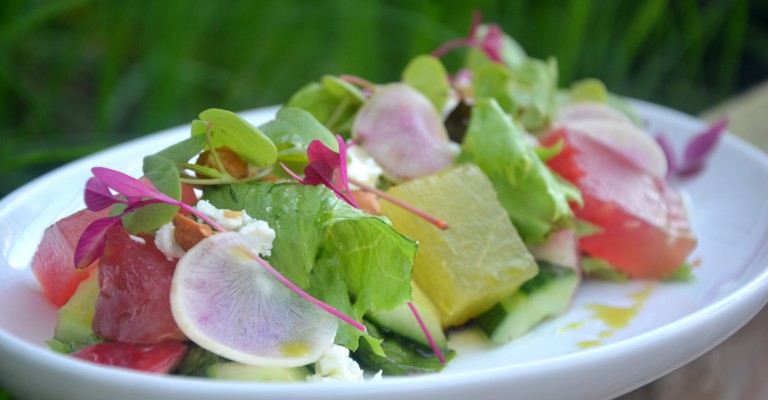There’s nothing quite like eating refreshingly cool and juicy watermelon on a hot day.
Why? Watermelons are about 92 percent water, making it a healthy and hydrating snack that helps you feel full for longer. The fibre and water content in the sweet pink flesh is also important for healthy digestion.
Preparation
- To make the vinaigrette, blend all the ingredients until combined. Place in a clean container until ready to use.
- To create the salad, blend the basil and olive oil for about 3 minutes. Strain the oil through a fine mesh strainer but do not force through the mesh, you just want the oil to drip out, leaving the solids behind. Once the oil has drained, discard the solids.
- Preheat an oven to 160°C. Place the hazelnuts on a sheet pan lined with parchment in an even layer. Toast for 6-8 minutes, or until gold brown. Take care not to over toast. As a general rule of thumb, if you can smell the hazelnuts' toasted fragrance while the oven is closed, then they are most likely burnt. Once toasted, allow to cool and lightly crush.
- Place the watermelon in a vacuum sealable bag and add ½ cup of the vinaigrette. Vacuum press the watermelon until compressed. This will depend on the system you have but vacuum pressing the watermelon is optional.
- Combine mixed greens, cucumbers, shaved java apples, and shaved radishes in a mixing bowl and dress with the vinaigrette, season with salt and pepper. Divide the dressed salad between the plates. Place the compressed watermelon, French feta and hazelnuts onto the salad. Drizzle the basil oil over the salad and finish with Cayman Sea Salt.
Tips from the author
This refreshing fruit is soaked with nutrients. Each juicy bite has significant levels of vitamins A, B6 and C, lots of lycopene, antioxidants and amino acids. There’s even a modest amount of potassium. Plus, this quintessential summer snack is fat-free, very low in sodium and has only about 40 calories per cup.
Several nutrients in watermelon have specific benefits for heart health. Watermelon’s high levels of lycopene are very effective at protecting cells from damage and may help lower the risk of heart disease. Also, the fruit’s concentrations of citrulline and arginine are good for your heart. Arginine can help improve blood flow and may help reduce the accumulation of excess fat. The lycopene in watermelon makes it an anti-inflammatory fruit.
Two vitamins in watermelon, A and C, are important for skin and hair health. Vitamin C helps your body make collagen, a protein that keeps your skin supple and your hair strong. Vitamin A helps create and repair skin cells. Without enough vitamin A, your skin can look dry and flaky. Both lycopene and beta-carotene may also help protect your skin from sunburn.
Like other fruits and vegetables, watermelons may be helpful in reducing the risk of cancer through their antioxidant properties.
Over 1,200 varieties of watermelon are grown worldwide.
In China and Japan watermelon is a popular gift to bring a host.
Click here to read more interesting facts about superfoods on my Paddock to Plate blog.

